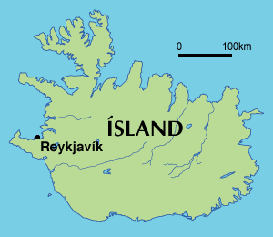Marine Biotechnology in Iceland
Go back to: Home > Strategies, Policies and Programmes > European countries
| UPDATED August 2016 |
Science strategies, plans and policies
The Science and Technology Policy Council[1] is responsible for setting public policy in matters of science and technology in Iceland. The role of the Science and Technology Policy Council is to support scientific research, science education and technological development in Iceland so as to strengthen the foundations of the Icelandic culture and increase the competitiveness of the economy. Science and Technology Policy and Action Plan for the period 2014 to 2016 is now in effect. Iceland does not have a dedicated Marine Biotechnology policy, strategy or plan, but there are policy documents, which are partly relevant for biotechnology research issues:
- Iceland 2020[2]
- Science and Technology Policy 2014-2016 from the Science and Technology Policy Council[1]
- Iceland’s Green Economy Policy [3]
Research funding schemes and programmes
The Ministry of Industries and Innovation [4] - The Ministry of Fisheries merged in 2012 with the Ministry of Industry, Energy and Tourism and part of the Ministry of Economic Affairs to form the the Ministry of Industries and Innovation. It covers all sectors of ordinary business and economic activity, including biotechnology.
The Icelandic Centre for Research (Rannis)[5] - RANNIS supports research, innovation, education and culture in Iceland. RANNIS cooperates closely with the Icelandic Science and Technology Policy Council and provides professional assistance in the preparation and implementation of the national science and technology policy.
- Main funds administered by Rannis:
- The Technology Development Fund – Fund for applied research and innovation projects.
- The Icelandic Research Fund – Fund for basic research projects
- Other National Research Funding Programmes which have a significant marine research element include:
- Main funds administered by Rannis:
Research priorities for marine biotechnology research
- Value addition of underutilised materials
- Processing by-products
- New raw materials, such as seaweed
- Bioprospecting and bioactive ingredients
- Marine microorganisms
- Industrial biotechnology
Strategic documents
English versions of strategic documents regarding biotechnology in Iceland are being developed. Most are still only available in Icelandic. An English draft of the Icelandic Biotech Sector Assessment is available but out of date. A report from 2007 on Biotechnology research policy and effort in Iceland that came out of an FP6 project is available but needs to be updated[8].
Infrastructures and coordination and support capacities / initiatives
The Marine Research Institute[9] is a government institute under the auspices of the Ministry of Industries and Innovation. The Institute conducts research regarding marine organisms and provides scientific advice based on its research on marine resources and the environment. The Marine Institute operates two research vessels.
Matis[10] is an independent research institute which strives toward innovation in the food industry, biotechnology and food security. Matis provides consultancy and services to companies in fisheries and agriculture as well as governmental agencies. Matis has participated in numerous international projects and is currently cooperating in a number of international projects, such as:
- SafeFishDish COFASP
- SeaBioTech FP7-KBBE-2012
- EnRichMar FP7-SME-2013
- BluePharmTrain FP7-PEOPLE-2013-ITN
- BlueGenics FP7-KBBE-2012
- Micro B3 FP7-OCEAN-2011
- MaCuMBA FP7-KBBE-2012
- DiscardLess H2020-SFS-2014-2 / RIA
The Iceland Ocean Cluster[11] is an innovation network of marine industry companies and start-up companies
Association of Biotech companies[12] defined by the Federations of Icelandic Industries
Universities
Major initiatives
Together with the Nordic countries, Iceland is actively cooperating in bio-economy in general, with its main emphasis on marine biotechnology.
References
- ↑ 1.0 1.1 http://www.vt.is/english/
- ↑ http://eng.forsaetisraduneyti.is/media/2020/iceland2020.pdf
- ↑ http://www.althingi.is/pdf/Green_economy.pdf
- ↑ https://eng.atvinnuvegaraduneyti.is/
- ↑ https://www.rannis.is/
- ↑ http://www.avs.is/
- ↑ http://nmi.is/studningur/styrkir/atak-til-atvinnuskoepunar/
- ↑ http://ec.europa.eu/research/biosociety/pdf/biopolis_iceland_en.pdf
- ↑ http://www.hafro.is/index_eng.php
- ↑ http://www.matis.is/english
- ↑ http://www.sjavarklasinn.is/en/
- ↑ http://www.si.is/english
- ↑ http://english.hi.is/
- ↑ http://english.unak.is/
- ↑ http://www.holar.is/en/english
Disclaimer
This country profile is based on available online information sources and contributions from various country experts and stakeholders. It does not claim to be complete or final, but should be considered as a dynamic and living information resource that will be elaborated, updated and improved as more information becomes available, including further inputs from experts and stakeholders. The information on this page is based on information initially compiled by the CSA MarineBiotech Project (2011-2013) and updated by the Marine Biotechnology ERA-NET (2013-2017).
